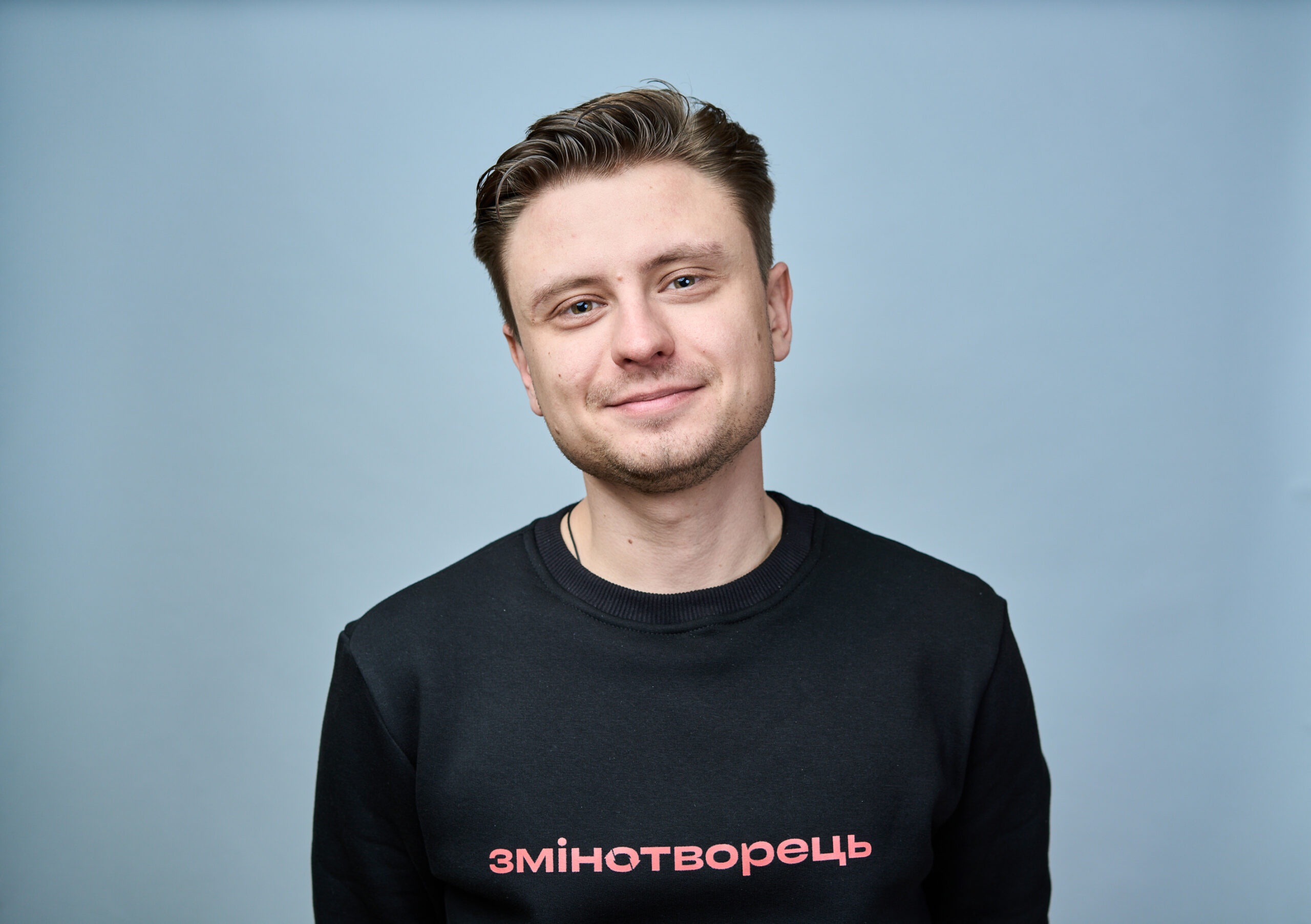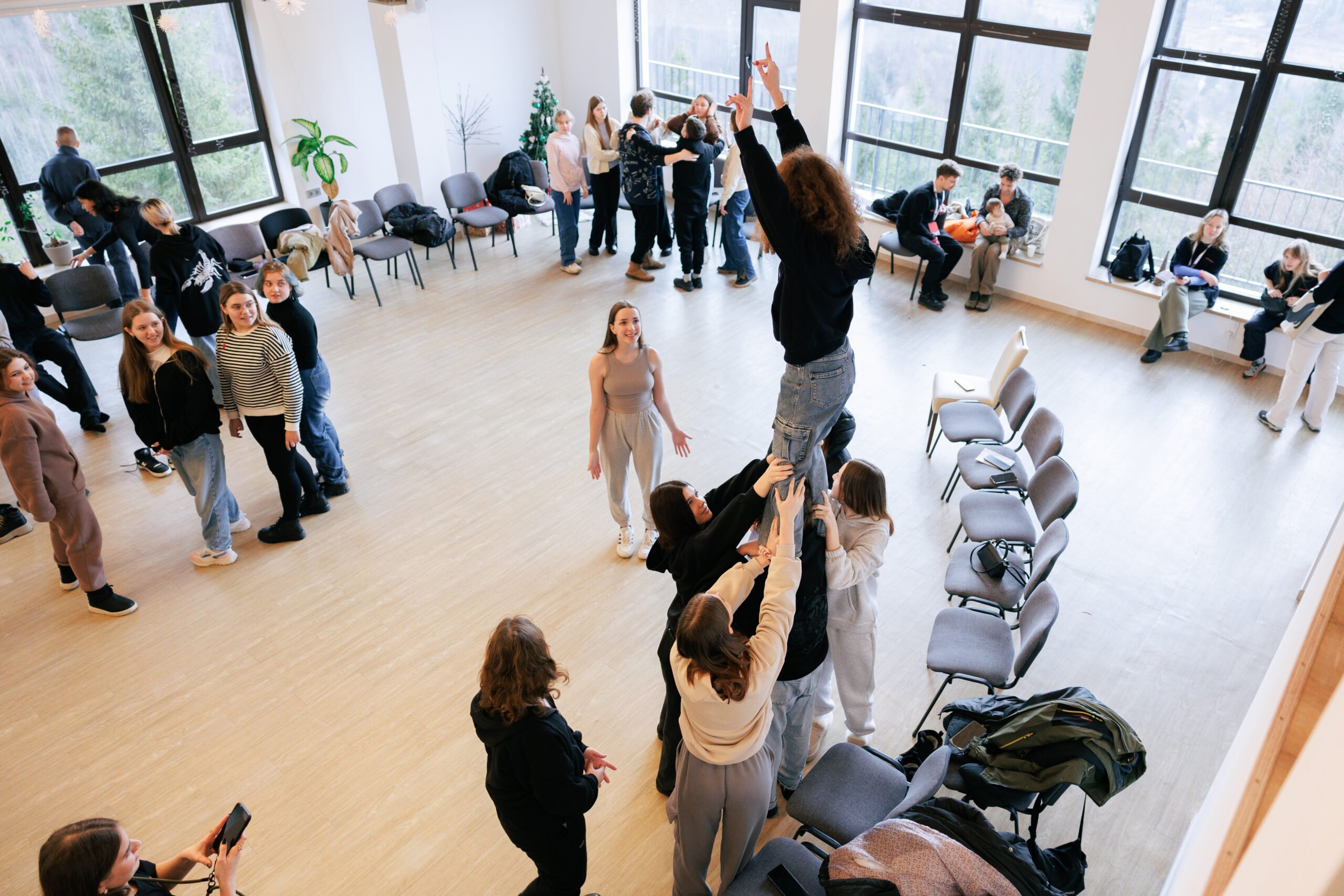
What's the problem?
Career choice is one of the most overwhelming decisions a young person has to make. The pressure to choose a financially stable profession that aligns with personal interests and meets societal expectations can be daunting for teenagers. In Ukraine, young people often feel that they are left alone with one of the biggest decisions of their lives, especially now, amid the war.
"No matter how hard it is, we understand that it's important for our future," says Valeria, a high school senior. "Some kids know what they want to be since childhood. Others figure it out in their final year of school. To be honest, it's really difficult for me to choose a profession right now, given the situation in the country. I don't know what to study or what career to pursue. I keep thinking about it because I know it's time. My parents also remind me that time flies, and I need to decide soon."

Daniela Puertas. Photo: Teens Academy
Nonprofits working with Ukrainian youth recognize this struggle. Daniela Puertas, founder of Teens Academy, a platform for youth development, says schools and adults don't give Ukrainian teenagers strategies for solving problems as they do, for instance, to help kids pass a math exam.
"When it comes to choosing a career — a decision that shapes their entire life — no one provides a clear roadmap. Not because there isn't one, but because there's no focus on it," says Puertas.

Vladyslav Hreziev. Photo: Zminotvortsi
Vladyslav Hreziev, co-founder of the Zminotvortsi educational initiative, highlights another problem. Teenagers' career choices are often shaped by the adults around them, especially their parents, and popular culture, like movies, rather than personal passion or market demand.
"Every time we visit a school, I ask high school students if they already know what career they want. On average, only about 2% have a clear answer. And out of that 2%, half have chosen their career either because a family member works in that field or because of the influence of social media, movies, and TV shows," Hreziev explains.
The Zminotvortsi co-founder adds that his organization observes a rising interest in military careers. Many of these teenagers have relatives serving in the armed forces, have lost loved ones in the war, or were influenced by TV shows or movies. Rubryka reported that the US Navy saw an 8% rise in recruitment after the release of Top Gun.
What's the solution?
Exploring your interests rather than careers
Career guidance is often reduced to societal expectations — pushing teenagers to pick something. Teens Academy founder Daniela Puertas believes there's a better approach. Before choosing a career, a person first needs to understand themselves: their dreams, interests, and desires, separate from any specific profession. Only then can they build a career path that aligns with who they are.
"A career isn't a goal — it's a tool. It's how you bring your purpose to life. You shouldn't fixate on choosing one profession for life. None of us can predict the future. Personal and professional growth is a long journey," she explains.
Daniela Puertas adds that many teenagers struggle to identify their interests:
"When a child has to choose a profession but isn't entirely sure what they like, it's not a problem — it just means they need more time. They do have interests. If they haven't discovered them yet, that doesn't mean they don't exist. Everyone has interests and talents. The key is to accept this uncertainty, explore their options, and work through it — either on their own or with professional guidance."

Teenagers during classes. Photo: Teens Academy
Ukrainian nonprofits, like Teens Academy and Zminotvortsi, are working to help teenagers discover their likes and dislikes, understand their strengths and long-term goals, redefining career counseling.
How does it work?
What do Ukrainian NGOs offer?
Hands-on experience
The first step to understanding yourself is trying things out — joining clubs, taking courses, doing internships, working on personal projects, or just experimenting with different interests. Nonprofits allow teens to explore many fields they don't think they have a natural talent for. If something doesn't click, acknowledge it and move on.
"I often give this example: What's your favorite coffee? How did you figure out that you like it? That's right — you tried it. To know what you enjoy, you have to try different things and rule out what you don't like. Parents sometimes get anxious when their kids start and quit different things, but that's the only way to discover what truly suits them," Teens Academy's Daniela Puertas says.

Photo: Teens Academy
Zminotvortsi co-founder Vladyslav Hreziev agrees the only way to figure out your direction is through hands-on experience. His initiative offers teenagers 12 courses covering relationships, business, politics, the arts, and military affairs.
"If a teenager finds a subject interesting and can see themselves in that field, that's already a broad roadmap for where to go next. From there, they can start narrowing down to specific careers," he explains.
For instance, one program participant took a State and Politics course and realized Ukraine's legislative system wasn't functioning well. That experience led her to decide she wanted to become president one day — to create change and help the country move forward.
Each course is interactive and discussion-based, encouraging self-reflection, teamwork, emotional intelligence, and critical thinking. The main rule is that the students should do most of the talking, not the teachers.
"Sometimes we run debates, flipped classrooms, or hands-on experiments. In one class on relationships, a teacher even asked students to wear mismatched shoes to school and describe how they felt when others looked at them. Our instructors' creativity is unlimited — in the boundaries of common sense and practical methods," says Hreziev.

Program participants. Photo: Zminotvortsi
After classes, students often launch their own projects. For example, Taras, from a small town started a YouTube channel interviewing local cultural figures, realizing that his community knew little about the region's artistic heritage.
Mentors and role models
Courses in Zminotvortsi are led by industry experts — veterans, psychologists, entrepreneurs, and more. "Our team was selected very carefully. We had high standards and strict criteria for their values, patriotism, and views," says Vladyslav Hreziev. "Through communication and interaction with these adults, the teenagers naturally gain role models. This influence is reflected in their mindset and outlook."

Vlad Bolsun is an instructor of the Business course. He owns a consulting agency for fashion brands and is a marketer, educator, and public figure. Photo: Zminotvortsi
Role models are people we look up to — those who embody the values and qualities we aspire to.
"We see the impact in the feedback we get from teenagers. Some instructors become real guides for them. Students share how teachers have influenced their lives. One student, for example, was so inspired by the Relationships course that he decided to become a psychologist," says the Zminotvortsi co-founder.
Ira, a young high schooler, confirms the significance of mentors. After taking the Business course, she is determined to open a private school and is already looking for like-minded people to help her bring her vision to life.
"I always wanted to be a teacher but decided against it because the profession is so underpaid. Zminotvortsi pushed me to follow my true path. They showed me that I need to express myself and follow my heart," says Ira. "I wanted to change the preschool education system. Now, I think I'll start my own business — a kindergarten."
Community
One of the biggest challenges stopping teens from bringing their ideas to life is the lack of like-minded people around them. Teens Academy founder Daniela Puertas agrees that everyone needs to have people who share their mindset, whether it's a hobby group, friends, a team, or even an Instagram group.
To help teens build their community, Zminotvortsi created an off-site camp program where teens can spend a few days together in the Carpathian Mountains, making new connections and building friendships.

Camp participants. Photo: Zminotvortsi
"In their towns, these kids can often feel like outsiders, depending on the circumstances. They're missing face-to-face connections. The camp gives them a chance to get that experience. And we make sure it's a safe space for them to do so," says Vladyslav.
By interacting with peers with entirely different interests, teens develop qualities that will benefit them both in their careers and throughout their lives.
Parent counseling
Ukrainian nonprofits counsel parents, trying to relieve the pressure on teens seeking their purpose.
"At Teens Academy, when we talk to parents, we try to take them back to the time when they were choosing their own profession," says Daniela. "We ask if they are happy with their choice, with their calling. Many parents say no. When we ask more questions, it turns out that most of those unhappy with their professional choices were influenced by their parents — of course, with good intentions."
Through these questions, the Teens Academy team helps parents understand how important it is to support their child within the family.
"Parents need to realize that career choice is something for an adult, independent person who has their worldview. If parents want to pass on their vision — even if they know their child very well — they're taking away their child's independence and the ability to resist that influence," says Daniela. "At the same time, parental influence is huge. That's why we believe in being present, not just pushing the child into the world and saying, 'Go figure it out.' They need to be there to help because family is there to support each other."

Photo: Teens Academy
Teens Academy advises parents to take an interest in their child's passions, even if they don't fall within the academic (school) system, and help the child explore themselves. The organization advises against empty praise like, "You're great," but recommends pointing out the child's strengths in everyday things: "You're good at solving conflicts," "You have a sense of style," and so on.
"Because a profession and calling aren't something special lying outside your life. It's about the everyday life you live, the details of each day," says Daniela.
We created this article as part of the Recovery Window Network. For more information on the recovery of war-affected regions in Ukraine, visit recovery.win
English editor: Oleksandra Voronina







